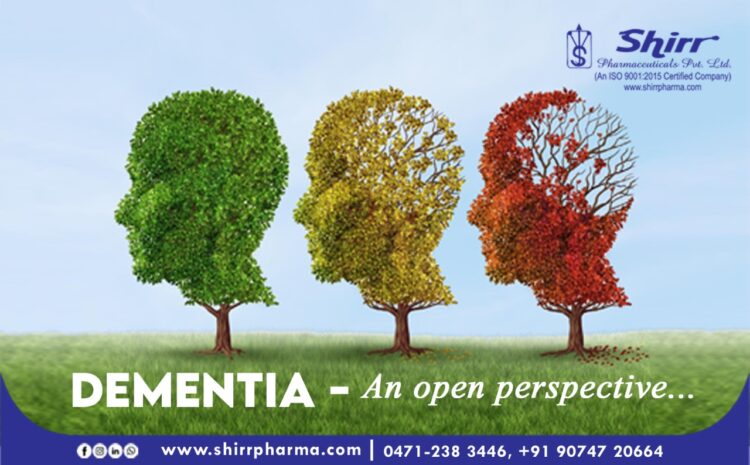
What’s dementia?
A decline in higher mental functioning ,remembering and reasoning ,without much motor deficits initially though it may accrue later on ,so that it interferes with a person’s daily life.
Who are prone?
Dementia affects the elderly (1/3rd of > 85 years may have dementia) but it is NOT part of normal aging. Many in their 90s live without any signs of loss of higher mental functioning.
Types of Dementia?
Different forms include Alzheimer’s disease, Frontotemporal dementia , Lewy body dementia ,Vascular dementia, mixed dementia etc. Symptoms variability depends on the demetia type.
What are the signs and symptoms of dementia?
When normal neurons, in the brain lose connections and die one becomes symptomatic. People with dementia experience an accelerated neuronal loss.
The symptoms of dementia can vary and may include:
- Experiencing confusion, amnesia
- Difficulty in expressive or receptive language function
- Unfamiliarity in familiar surroundings
- Difficulty in financial tasks
- Verbigeration or repeating unnecessarily
- Neologisms or using new/unusual words
- Bradyphrenia or taking longer to complete thoughts, as well as to complete daily tasks
- Visual hallucinations or delusions
- Impulsively
- Apathy
- Imbalance and problems with movement
People with intellectual and developmental disabilities can also develop dementia as they age, and recognizing their symptoms can be particularly difficult
What causes dementia?
The causes of Alzheimer’s and related dementias can vary. Rare genetic mutations may cause dementia in a minority. Higher educational levels, avoiding head injury, and leading a healthy lifestyle by avoiding nicotine /excess alcohol may help reduce risk factors that have been associated with these diseases.
What are the different types of dementia?
The five most common forms of dementia are:
- Alzheimer’s disease, is the most frequent dementia diagnosis among older adults due to abnormal buildups of proteins known as amyloid plaques and tau tangles.
- Frontotemporal dementia, a rare form of dementia that tends to occur in people younger than 60. It is associated with abnormal amounts or forms of the proteins tau and TDP-43.
- Lewy body dementia, a form of dementia caused by abnormal deposits of the protein alpha-synuclein, called Lewy bodies.
- Vascular dementia, a form of dementia caused by conditions that damage blood vessels in the brain or interrupt the flow of blood and oxygen to the brain.
- Mixed dementia, indicates a combination of two types of dementia.

How is dementia diagnosed?
- To diagnose dementia, rule out potentially treatable conditions that may relate to cognitive difficulties. Checking levels of various electrolytes, hormones, and vitamins, can help.
- A review of a person’s medical and family history can provide important clues about risk for dementia -whether it runs in the family and its inheritance chance and pattern.
- Cognitive and neuropsychological tests. These tests are used to assess thinking and physical functioning. These include assessments of memory, problem solving, language skills, and math skills, as well as balance, sensory response, and reflexes.
- Brain scans. Computed tomography (CT), or Magnetic resonance imaging (MRI), or Positron emission tomography (PET)
- Psychiatric evaluation to assess if another mental health condition is contributing to pseudo dementia namely depression.
- Genetic tests
- Blood tests. It is now possible for doctors to order a blood test to measure levels of beta-amyloid, a protein that accumulates abnormally in people with Alzheimer’s. Several other blood tests are in development. However, the availability of these diagnostic tests for Alzheimer’s and related dementias is still limited.
- Early detection is important, in managing the condition and planning ahead.
- Brain donation after death helps researchers study dementias. When donating as part of a research study there is no cost incurred to the family.
What is mixed dementia?
It is common to have more than one form of dementia. Many have both Alzheimer’s disease and vascular dementia. Most people > 80 years probably have mixed dementia related to Alzheimer’s disease and vascular disease-related processes, leading to neuron loss .Scientists are investigating how the underlying disease processes in mixed dementia start and influence each other. Further knowledge is needed to develop more personalized prevention and treatment strategies. Other conditions that cause pseudo dementia-like stress, anxiety, depression, can resemble dementia, as can side effects of certain medicines. Researchers have also identified many other infective conditions mimicking dementia or dementia-like symptoms.eg HIV-associated dementia, a disease that occurs when the HIV virus spreads to the brain



